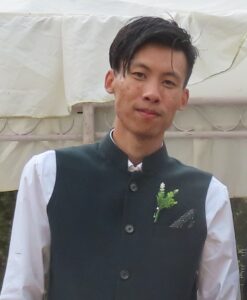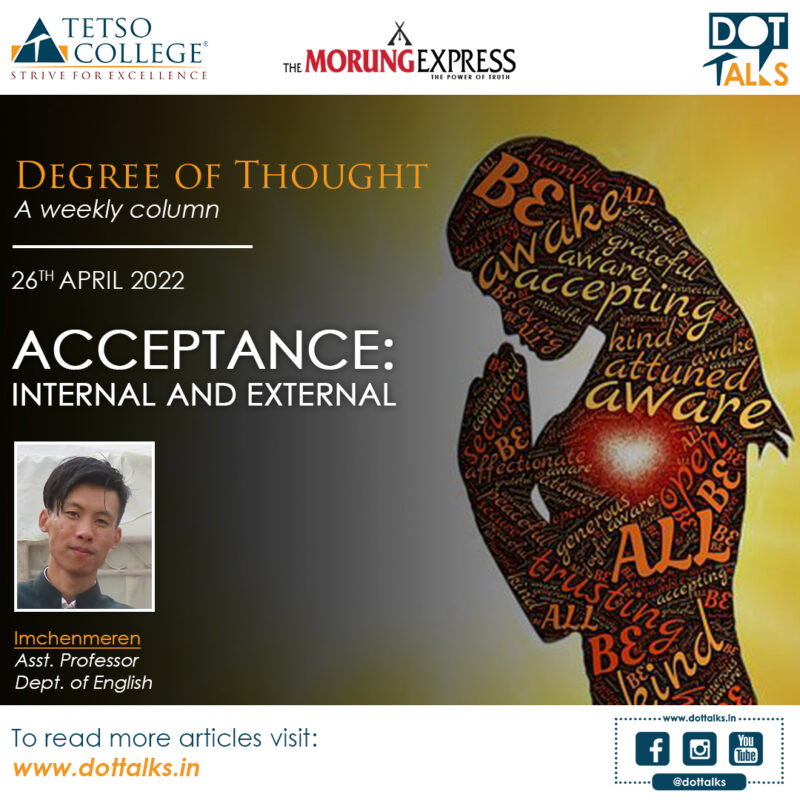 Acceptance is necessary for our healing process. Acceptance also plays a crucial role in positive mental health, well-being and quality of life. To practice acceptance, we must acknowledge all of the uncomfortable parts of human life including that of individual emotions, thoughts, and past. Every person is unique- a masterpiece created by GOD, hence, deserves to be lived unjudged. Practicing acceptance- a way to live a life.
Acceptance is necessary for our healing process. Acceptance also plays a crucial role in positive mental health, well-being and quality of life. To practice acceptance, we must acknowledge all of the uncomfortable parts of human life including that of individual emotions, thoughts, and past. Every person is unique- a masterpiece created by GOD, hence, deserves to be lived unjudged. Practicing acceptance- a way to live a life.
Acceptance: Internal and External
We all desire something in our lives. We base our lives on the things we want to achieve or obtain. Such desires may take the form of glory, riches, power, status, solitude, peace, acceptance, etc. In this article, I specifically talk about people who desire for acceptance from others.
From Sigmund Freud’s perspective, ‘Thanatos’ is a state where an individual perverts towards death and destruction for others and themselves. This happens because of an incident that occurs in their life, resulting in them forming a suppressed ‘trauma’ in their unconscious mind. This incident plays an important role in transforming, and altering the character and behavior of an individual into something that may be the total opposite of who he or she really is.
The idea of ‘trauma’ of which I speak is something that may be significant to some people while to others it may not be. For instance, in the case of the character Pecola from the novel, The Bluest Eye by Toni Morrison, the rejection that society places on her because she has black skin becomes a trauma. She is incapable of accepting herself; this is why she creates a world of reality by illusion, believing to be accepted by all.
A further example can be identified in the character, ‘Thanos’ of the Avengers series. The day Thanos was born, his own mother Sui-San attempts to kill him simply because he was born differently because of a genetic mutation. His mother calls him ‘devil’ and holds him in contempt. His father ignores him and focuses mostly on scientific research. The trauma of being different from his own people haunts him. He is unable to accept his true self and neither is he able to find out his true self even after several killings and dissection of his people and his own mother
I’m not sensationalizing these characters as something people should feel sorry for. What I’m saying here is that these characters have dealt with certain incidents in their lives that have caused them to form a trauma within them. As a result, the trauma affected their behavior and character. If we speak about the reality of today’s world, many people suffer from this type of trauma both internally and externally. When I say ‘internally’, I mean an individual’s internal acceptance of who they really are, whereas ‘externally’ refers to the external acceptance of their true self by others.
There are several moral stories, morality plays, and novels about how love, kindness and acceptance can change a man rather than violence. In the short play The Bishop’s Candlesticks by Norman Mckinnel, the bishop accepts and pardons the prisoner who was a thief. He transforms the convict to a better man through love and kindness. In Ruskin Bond’s short story, The Thief, Arun turns Deepak from a thief into a better man through acceptance, love, and kindness. These two characters become better individuals and are able to shine because they are accepted by others. I mean, even the character Loki portrayed as a villain in Avengers series sacrifices himself which makes him a hero. It’s only when the heroes accept him that he truly shines to the audience and the other characters in the movie.
Today, people are under a great deal of pressure from their families, friends, teachers, society and loved ones to be what they are not. From Erik Erikson’s perspective, there ought to be a balance of control over a person in any way. Parents should allow their children to explore their skills and capabilities without forcing them to do what they want the child to do. Educators should identify and motivate a child to develop their talent and skills. Society needs to stop ignoring, and accept someone for who they really are, and stop forcing individuals to become what they want him or her to be. Self-esteem and self-respect are things that an individual should really focus on. All these various faculties constitute the very essence of a sound personality. When an individual is compelled to be something or someone that he is not; discarded, and ignored by those around him; it leads to perversion.
Degree of Thought is a weekly community column initiated by Tetso College in partnership with The Morung Express. Degree of Thought will delve into the social, cultural, political and educational issues around us. The views expressed here do not reflect the opinion of the institution. Tetso College is a NAAC Accredited UGC recognised Commerce and Arts College. The editors are Dr Hewasa Lorin, Dr Aniruddha Babar, Khangpuiliu Pamei, Rinsit B Sareo, Meren and Kvulo Lorin.
For feedback or comments please email: dot@tetsocollege.org

